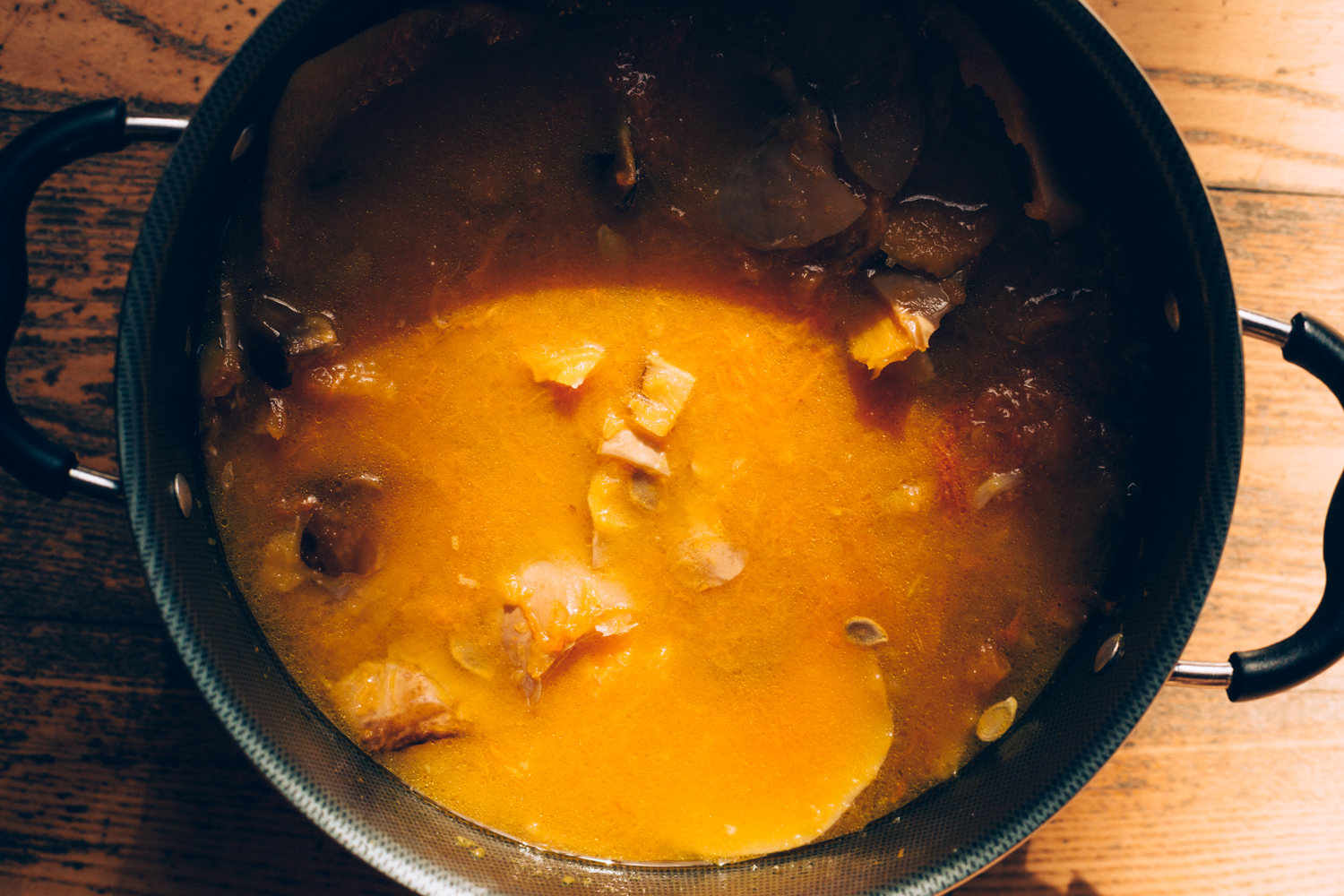Words by Katy Anne, Photos by Ilana Freddye
Around this time last year, I had a killer meal at Mission Chinese Food in NYC: rice fried in chicken fat, chewy pieces of dried pineapple and thinly-shaved limes, some thick spicy noodles… and then there was the quiet side dish that I almost didn’t order: pea leaves in pumpkin broth.
A light, creamy, neon orange broth that tasted like a jack-o-lantern smells right when you cut off the lid. They poached greenmarket pea leaves in the broth and topped it with a spoonful of fermented chiles, and it made for an unfamiliar amalgamation of Spring and Autumn that I really, really liked. The more I ate it, the more infatuated I became with how to make it.
I’ll never know exactly how they did it (Danny Bowen, are you listening?), but I did some research and some experimenting and came up with a recipe for “Squash Broth.” It makes use of all the odd ends and innards of any squash or pumpkin, and with a few aromatics, makes a deeply flavorful stock that can be used as a base for different soups - or used to poach some greens or pea leaves a la that dish at Mission Chinese.
Every time you make squash this winter, save the seeds / innards (think everything you pull out of the pumpkin when you carve it), plus any of the tops / scraps from cutting it, and keep it in a bag in the freezer. Anything will do - and keep in mind that the more squash flesh you use (like the actual edible part) in the broth, the creamier your broth will be - plus you can blend in some of the cooked squash at the end to make it extra creamy (more on that below).
Squash Stock
Yield: About 4 cups strained stock
The scraps (tops/odd ends) / innards /seeds from any mix of squashes
2-3 good hunks of squash (any winter variety will do)
1 thumb-size knob of ginger
1 head garlic, cut in half (optional)
1 handful cilantro or parsley stems, onion skins, or lemongrass (optional)
Add all ingredients to a large pot & cover with water, at least 2 inches above the ingredients. Don’t skimp - the water evaporates as it cooks.
Bring to a boil over high heat, then immediately reduce to low and simmer for 1-2 hours, until all of your squash falls apart and the broth gets a little creamy.
When it is ready it will taste of savory squash and be thicker than water.
Strain broth through a fine mesh seive (or colander or cheese cloth if you don’t have) into a large bowl or another large pot.
If there are any discernible chunks of squash - remove them from the strained stuff and blend with your stock for a creamier texture, leaving out the skin. You can also just whisk into the stock for a chunkier broth.
TO SERVE
Use as a flavorful base for a pureed squash soup, or a vegetable soup like ribolita, minestrone, or Japanese dashi.
Or Use as a broth:
Heat the stock to a simmer. Season generously with salt. Add a few hunks of winter squash and keep simmering for about 30 minutes until they’re soft enough to eat but not falling apart. After the squash cooks, you can add any variety of greens - spinach works well and so do pea leaves. They will poach in under a minute and the soup is ready to serve. You can also add kale or Swiss chard, which will take a little longer to soften. Whichever green you use, be sure to add it to the simmering broth right before serving - if you do it too far in advance, the greens will turn brown.
ZERO-WASTE BONUS
Pick the seeds out of your strained squash scraps, rinse under cold water, and then roast. Dry them well, toss with olive or neutral oil and plenty of salt, and bake at 375F until toasty - about 25 minutes.
TOP YOUR SOUP
You can try any assortment of toppings, I like fermented chiles (think sambal) and toasted pumpkin seeds. It would also be good with a swirl of yogurt and chopped cilantro, some orange zest and black pepper, or a heavy spoonful of kimchi.








